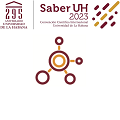Ponente
Descripción
Non-viral delivery systems of nucleic acids (NVDS) have a limited ability to evade the endolysosomal machinery [1]. Nucleic acid degradation derived from a reduced endosomal escape renders these systems more inefficient than their viral counterpart. A strategy to counteract this limitation may be the incorporation of bio-responding pore-forming proteins [2]. Sticholysins may be candidates because their activities are potent and very stable [3] although are not regulated by any of the physiological changes occurred in the endosomal maturation process. In order to control the pore-forming activity of the mutant StIW111C, we obtained, purified, and characterized this protein conjugated to the polylysine peptide K16C by disulfide bonds. To obtain the conjugate, two oxidation reactions will be carried out using 10% and 20% dimethyl sulfoxide. It was observed by digital densitometry of native electrophoresis that the conjugation yield with 10% dimethyl sulfoxide was higher, achieving 80%, which was also confirmed in the conjugate purification step. The pore-forming activity, totally abrogated in the conjugate, is recovered in the presence of a reducing environment which correlates with the separation of the conjugate components. These results point to StIW111C as a possible programmable component of NVDSs with a very probable ability to destabilize the endosomal compartment.

